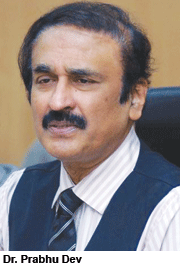It sounds like a story out of Ripley’s Believe It or Not. Currently there are 128 ‘ghost’ undergraduate colleges — some without a single student — operational in the garden city of Bangalore.
According to Sridhar Vivan, a journalist with the Bangalore Mirror, 128 undergraduate colleges under the Bangalore University (estb. 1964) umbrella, which shelters 540 affiliated colleges with an aggregate enrolment of 600,000 students, haven’t admitted even one student in the academic year 2010-11 which began five months ago. While there are no students at all enroled in 128 of the 540 affiliated colleges of BU, another 28 have less than ten students. “Bangalore University stumbled on the trail when it found that these colleges had not sent in their admission lists for the year. The deadline for submission of the lists expired on August 31,” writes Vivan (October 21).
 Bangalore University’s vice chancellor Prabhu Dev confirms that the 128 ‘ghost’ colleges identified by the daily are affiliated with the varsity, but passes the buck to BU’s local inspection committees (LICs) which are mandated to inspect all new colleges and recommend affiliation to the university. “Local inspection committees need to be blamed. How could these committees recommend affiliation of colleges to which students are unwilling to go?” he laments.
Bangalore University’s vice chancellor Prabhu Dev confirms that the 128 ‘ghost’ colleges identified by the daily are affiliated with the varsity, but passes the buck to BU’s local inspection committees (LICs) which are mandated to inspect all new colleges and recommend affiliation to the university. “Local inspection committees need to be blamed. How could these committees recommend affiliation of colleges to which students are unwilling to go?” he laments.
The case of Bangalore University’s ghost colleges exposes the fragmented management structure of this varsity whose once good reputation has nose-dived in recent years because of persistent interference from the state government (which funds it with an annual grant of Rs.45 crore). LIC members are appointed by the BU syndicate, the university’s highest executive authority. Unfortunately over the past decade in particular, the character of the syndicate has been steadily transformed by appointing ruling party has-beens and vote bank managers. In 2004 the Congress government’s proposal to amend the Karnataka State Universities (KSU) Act, 2000, to facilitate government nomination of “people who have served the cause of education” rather than “eminent educationists” to the syndicates of the state’s seven universities as stipulated by s.28(g) of the KSU Act, provoked widespread public outrage. In 2006 the JD(S)-BJP coalition government dropped this proposal.
“LICs are required to rigorously evaluate every collegiate proposal for affiliation and ensure that the institution meets the requisite infrastructure standards, faculty norms and has sufficient financial resources. The committees also evaluate whether there is sufficient demand for an undergrad college in the proposed area. But typically, most LICs turn a blind eye to these issues, and since they are answerable to the syndicate, the university management can’t hold them accou-ntable. There is an urgent need to revamp the entire affiliation process,” says Dr. M.S. Thimappa, former vice chancellor of Bangalore University and a highly respected educationist.
According to Thimappa, the existence of the 128 ‘ghost’ undergraduate colleges — most of which have been promoted post 1994 — causes no loss to the public exchequer because the state government terminated all grants to private higher education institutions promoted after that year. Yet the danger is that unwary students may sign up for study programmes advertised by these defunct colleges flaunting their affili-ation with Bangalore University. Students attracted by their ad campaigns are unlikely to be aware that the failure of these colleges to submit current admission lists to the university disqualifies them from writing BU examinations, and hence they would be ineligible for the university’s degrees or certification.
Meanwhile with the BU academic council set to meet on November 4 to discuss issuance of show-cause notices to its 128 affiliated ‘ghost’ colleges, clearly, a thorough review and overhaul of the accreditation and affiliation processes of BU is overdue, to save the reputation of this once prestigious university — or whatever is left of it.
Summiya Yasmeen (Bangalore)